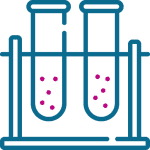HDL (α) cholesterol
HDL cholesterol testing is used to properly assess the risk of cardiovascular disease.
6,00 €

What is the need for a study?
HDL cholesterol testing is used to properly assess the risk of cardiovascular disease. The test is required if other lipidogram tests (cholesterol, low-density lipoprotein (LDL) cholesterol and triacylglycerols) have high values.
When should I be tested?
For adults, it is recommended to have HDL cholesterol tests every five years. The test is performed more frequently (up to several times a year) in patients who have been prescribed a diet and/or cholesterol-lowering drugs to check the effectiveness of the adapted measures. Raising HDL cholesterol to a desirable level means a lower risk of heart disease. HDL cholesterol tests are also more commonly prescribed for people who are at higher risk of heart disease: smokers, people over 45. for men or women aged 55 or over women with hypertension (blood pressure above 140/90 mmHg or on blood pressure-lowering medication), diabetes, and known history of cardiovascular disease in relatives at an early age (up to age 55 for men and up to age 65 for women).
What sample is needed for the test?
Blood is drawn from a vein in the arm.
How to prepare for the survey?
You should abstain from eating for 9-12 hours before the sample is taken. You can only drink water.
What do my results mean?
A high HDL cholesterol score is better than a low one. HDL cholesterol levels below 1.0 mmol/l in men and below 1.3 mmol/l in women increase the risk of coronary heart disease. HDL cholesterol levels of 1.0-1.3 mmol/l for men and 1.3-1.5 mmol/l for women indicate an average risk of heart disease. A HDL cholesterol level >of 1.55 mmol/l means that the risk is below average.
NOTE! HDL cholesterol results need to be considered in the context of the results of other lipidogram tests. You should consult your doctor about other risk factors for cardiovascular disease.
Related studies
Glucose, high-sensitivity C-reactive protein, NT-proBNP, total cholesterol, LDL-cholesterol, triacylglycerols, non-HDL-cholesterol, atherogenic index
Related conditions/diseases.
Cardiovascular diseases: myocardial infarction, stroke, hypertension.
You can consult our family doctors.
